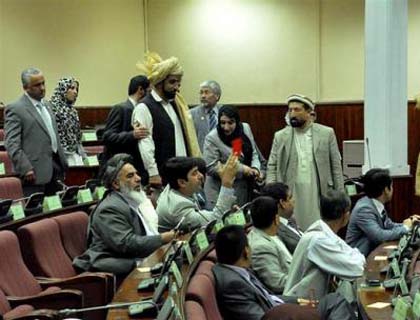with the Wolesi Jirga’s tenure almost over, there are efforts underway to have the mandate of the Lower House of the parliament extended. According to reports, the leaders of the National Unity Government (NUG) along with representatives of other related agencies are set to discuss extension of the House of Representatives. The legal tenure of the Lower House of the parliament is to end in less than two weeks, while the government has failed to organize the parliamentary elections on time as envisaged by the constitution. With more than three months passing since President Ashraf Ghani established the Electoral Reform Commission to bring changes and reforms to the election bodies and the electoral procedures. However, the commission is yet to establish any reform agenda and it still remains unknown if the commission would bring any changes to Afghanistan’s electoral system.
There have been growing concerns over the fate of Afghanistan’s legislative branch of state and the much-awaited reforms to the electoral system in Afghanistan. Many involved parties including election monitoring organizations, political figures, government officials and activists have called on the government to end the arbitrary handling of the electoral reforms which has endangered the parliamentary elections. Reform to the electoral systems and procedures was one of the main components of an agreement mediated by US State Secretary John Kerry which led to formation of the Afghan National Unity Government. However, the leaders of the unity government have been unable of making compromises for overcoming their main differences regarding the nature of the reforms to the electoral system as well as authority and leadership of the members of the electoral reforms commission.
The leaders of the NUG have repeatedly assured that the electoral reforms would start soon and that the reforms would take place. However, the fate of the parliamentary elections is already in limbo as the legitimacy of the Wolesi Jirga would be inevitably questioned when it crosses beyond its legal term. There could be a daunting failure for the parliamentary elections if the leaders of the NUG fail to agree on a reform agenda immediately. Some sort of setbacks is already inevitable given the current conditions. There is no agreed agenda for reforms to the electoral system and there is no political will in the NUG for bringing the reforms. The international donors have already refused to provide the required funding for the parliamentary elections, objecting Afghan government’s failure to implement reforms to the electoral system.
Afghanistan today is facing a multitude of challenges in security, economic and administrative areas. Adding another setback in the state-building process would leave Afghanistan vulnerable if not derail the constitutional course of the country. There are different factors involved in the government’s failure to establish a reform agenda and get preparations for the parliamentary elections. There is no firm commitment and political will from the NUG leaders to agree on a reform agenda for the electoral reforms commission. The nature of the power sharing arrangement in the national unity government has left the stakeholders of the government in unending power struggle. There have been differences not only over who should lead the commission responsible for proposing reforms but also about the nature of reforms in the electoral system, bodies and procedures.
On the other hand, the exacerbating security in the country have left the government officials preoccupied with tackling the deteriorating economic, security and day-to-day affairs of the country. On the other hand, public trust on the government for making reforms to the electoral system has been in decline. On their part, the international donors of Afghanistan, made their funding for the upcoming presidential elections conditional to the electoral reforms. Many of the involved parties including Western supporters of Afghanistan have ruled out holding the elections without the required reforms. All these factors worked in the same direction in putting the fate of the parliamentary elections in limbo with no reform plans established for the electoral reforms commission.
The parliamentary elections were meant to be a fair and sound election process so to avoid a problematic outcome such as the last year presidential elections. However, it is already clear that there would a potential setback regarding the electoral reforms and the forthcoming parliamentary elections. If there is no efficient management of the electoral politics, the setback in holding the parliamentary elections could mean political uncertainties, unconstitutionalities in the political system, disruptions in legitimate governance and a crisis close to the last year protracted presidential election crisis for the country.
Any measure for the fate of the legislative branch of the government of Afghanistan will be potentially challenging. Extension of tenure of the current House is seen as a pragmatic solution for many, while from points of views of many others, such a solution is unconstitutional and illegal. On the other hand, in absence of a functioning legal branch in the country the whole state’s legitimacy would be further undermined. The government must heed to the calls for brining reforms to the electoral and holding the parliamentary elections as soon as possible.

